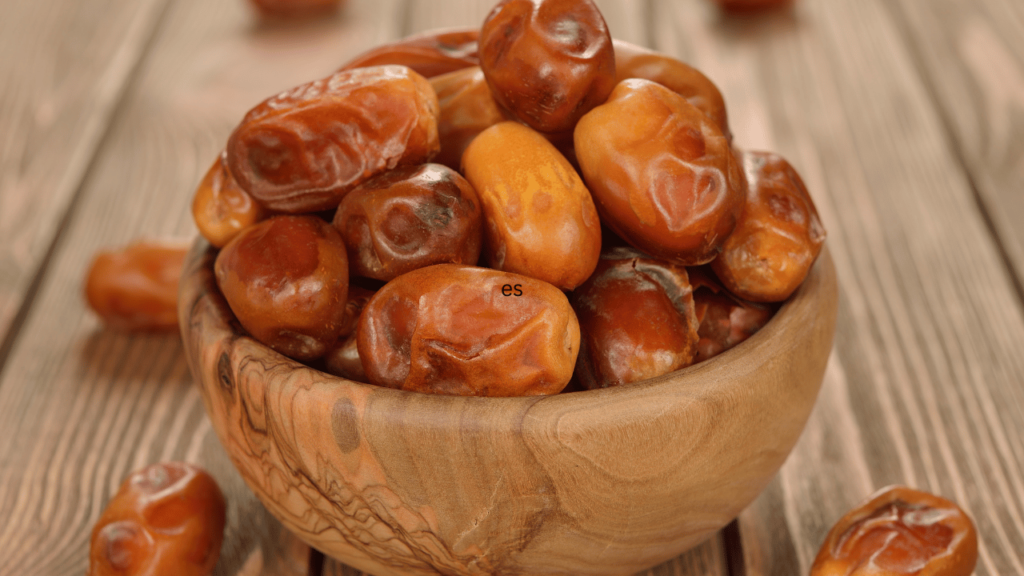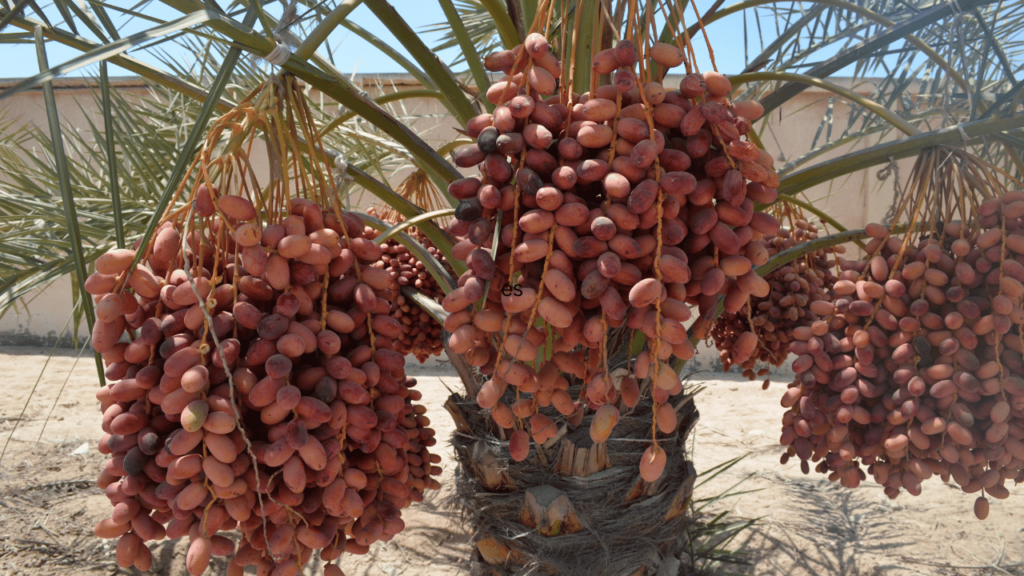Fresh Dates
Fresh dates are the juicy, succulent fruits that come directly from the date palm tree. Unlike dried dates, which have a chewy and concentrated sweetness, fresh dates have a softer texture and a milder taste. They are plump, moist, and often have a slightly crunchy texture. Fresh dates are usually enjoyed as a snack or used in various culinary preparations. They are a delightful treat when they’re in season and can be a delicious addition to your diet.

How Fresh Dates Grow?
Dates grow on date palm trees, which are native to the Middle East and North Africa. The trees thrive in warm, arid climates and can reach up to 75 feet in height. The dates themselves grow in large clusters called “date bunches” that hang from the branches of the tree. Each bunch can contain hundreds of individual dates. As the dates ripen, they change in color from green to yellow, amber, or dark brown, depending on the variety.

Cultivation Of Dates
Dates are primarily found in countries with warm, arid climates. They are most commonly grown in countries such as Saudi Arabia, Egypt, Iran, Iraq, and Algeria. These regions provide the ideal conditions for date palm trees to thrive and produce delicious dates.
Types Of Dates
Here are some more details about the types of dates:
- Medjool dates: These are often referred to as the “king of dates” due to their large size and luxurious taste. They have a soft, chewy texture and a sweet, caramel-like flavor. Medjool dates are commonly enjoyed as a snack or used in desserts.
- Deglet Noor dates: Known for their translucent appearance and amber color, Deglet Noor dates have a slightly drier texture compared to Medjool dates. They have a mildly sweet and nutty flavor, making them versatile for both sweet and savory dishes.

- Barhi dates: These dates are unique as they are typically consumed when they are still in their crunchy, yellow stage. They have a delicate, honey-like taste and a firm texture. Barhi dates are often enjoyed fresh or used in salads and desserts.
- Zahidi dates: Zahidi dates are smaller in size and have a more firm texture compared to other varieties. They have a golden color and a sweet, nutty flavor. Zahidi dates are commonly used in baking, cooking, or enjoyed as a healthy snack.
These are just a few examples of the diverse and delicious types of dates available. Each variety has its own distinct characteristics, making the world of dates quite fascinating to explore.
Benefits Of Dates
Dates are not only delicious but also offer several health benefits. Here are some benefits of dates:
- Nutrient-rich: Dates are packed with essential nutrients like fiber, potassium, magnesium, and vitamins B6 and K.
- Energy boost: Dates are a great source of natural sugars, making them a quick and energizing snack.
- Digestive health: The high fiber content in dates can aid in digestion and promote regular bowel movements.
- Heart health: Dates are cholesterol-free and contain antioxidants that may help reduce the risk of heart disease.
- Bone health: Dates are a good source of minerals like calcium and magnesium, which are important for maintaining strong bones.
- Natural sweetness: Dates can be used as a natural sweetener in various recipes, providing a healthier alternative to refined sugar.
Remember, moderation is key when enjoying dates due to their natural sugar content. They make a tasty and nutritious addition to a balanced diet.
Dishes Of Dates
There are so many delicious dishes that incorporate dates! Here are a few famous ones:
- Sticky toffee pudding: A classic British dessert made with dates, served warm with a rich toffee sauce.
- Ma’amoul: A traditional Middle Eastern pastry filled with a mixture of dates, nuts, and spices. It’s often enjoyed during festive occasions.
- Date squares: A sweet treat made with layers of date filling between a buttery oat crust and crumble topping.
- Date and walnut cake: A moist and flavorful cake made with dates and walnuts, often served with a drizzle of caramel or toffee sauce.
- Date smoothies: Dates can be blended with fruits, yogurt, and milk to create a creamy and nutritious smoothie.
These are just a few examples, and there are countless other creative ways to incorporate dates into dishes. Whether it’s desserts, baked goods, or even savory recipes, dates add a delightful touch of sweetness and depth of flavor.
Side Effects Of Dates
Dates are generally safe to consume and offer many health benefits. However, it’s important to keep in mind a few considerations:
- High sugar content: Dates are naturally sweet and contain a significant amount of sugar. While this can provide a quick energy boost, it’s essential to consume them in moderation, especially if you have diabetes or are watching your sugar intake.
- Caloric density: Dates are calorie-dense, meaning they contain a relatively high number of calories in a small serving. If you’re trying to manage your weight, it’s important to be mindful of portion sizes.
- Allergies: Some individuals may have allergies to dates or other fruits. If you experience any allergic reactions like itching, swelling, or difficulty breathing after consuming dates, it’s best to avoid them and consult a healthcare professional.
- Digestive issues: Dates are high in fiber, which can be beneficial for digestion. However, consuming excessive amounts of dates or suddenly increasing your fiber intake may cause digestive discomfort, such as bloating or diarrhea. It’s best to introduce dates gradually into your diet and drink plenty of water to support proper digestion.
Remember, everyone’s body is unique, so it’s essential to listen to your own body and adjust your consumption accordingly. If you have any specific concerns or health conditions, it’s always a good idea to consult with a healthcare professional.